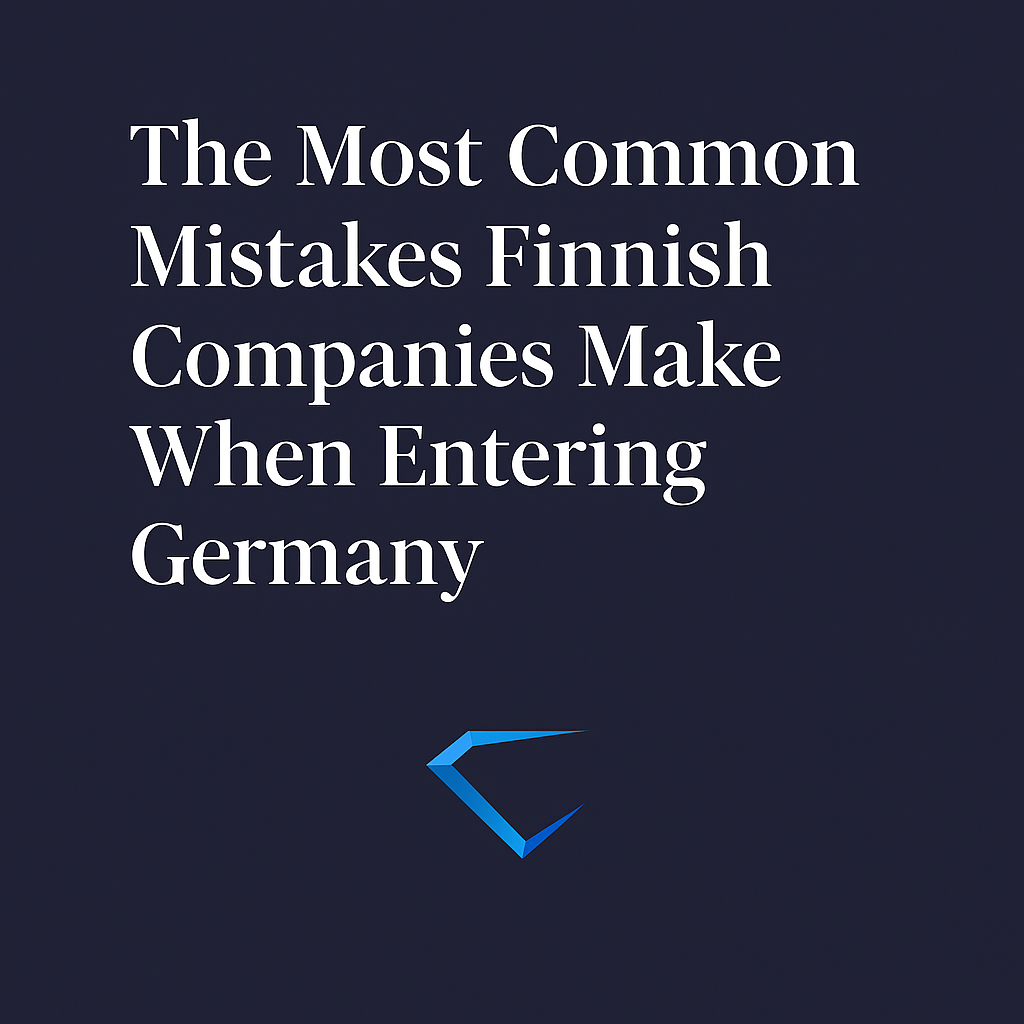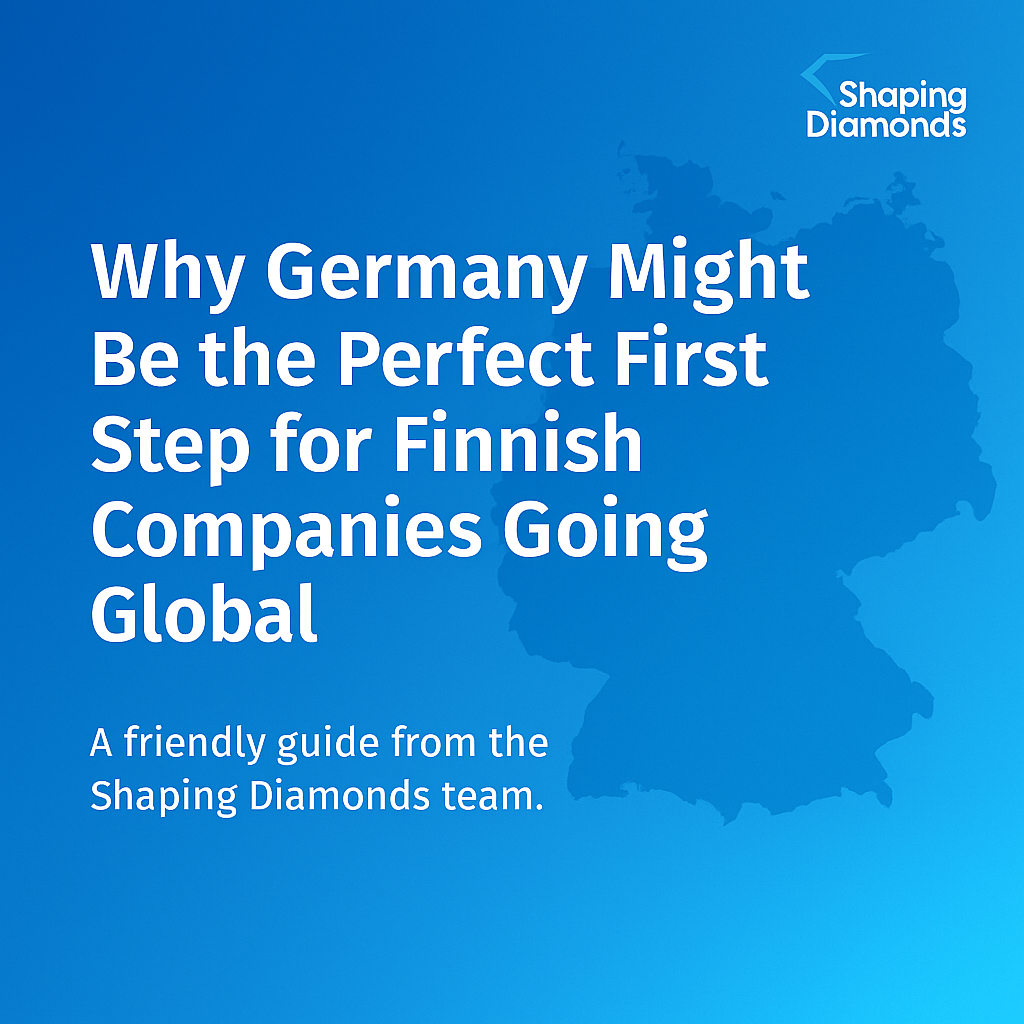(Or: what we wish someone had told us before our first German meeting.)
So, you’ve decided Germany is your next big market. Excellent choice — strong economy, loyal customers, endless opportunity. But here’s the thing: it’s also a place where “almost ready” isn’t quite good enough.
We’ve seen the ups and downs ourselves — regular story; a small Finnish-owned company that landed in Germany, armed with optimism, PowerPoint slides, and just a hint of naivety.
Here are the most common mistakes many other Finnish companies have seen — and how you can avoid them.
1. Assuming that “Europe” is one big market
We get it — Germany feels close to home. It’s in the EU, it’s full of engineers, and people even like saunas here. But make no mistake: the German market has its own rules, rhythms, and expectations.
Pricing, distribution, certifications, even communication styles differ — sometimes dramatically. What works in Espoo might fall flat in Essen.
What to think of:
Treat Germany as its own unique market. Do your research, talk to locals, and adapt your approach instead of copy-pasting your Finnish strategy.
2. Underestimating the importance of language
Yes, Germans speak English. No, that doesn’t mean you can skip translation.
Even in 2025, many B2B and B2C buyers expect materials, websites, and contracts in German. It’s a matter of trust and professionalism.
What to do:
Invest early in good translations — not just literal ones, but native-level messaging that fits the tone of German business culture. Also Shaping Diamonds can help you here, as we are geared with native level speakers.
Pro tip: “trustworthy” in Finnish marketing copy doesn’t automatically sound trustworthy in German.
3. Thinking your product will “sell itself”
Finnish companies often rely on technical excellence. And rightly so — our products are good. But in Germany, that alone rarely closes deals.
Here, success also depends on visibility, references, and relationships. Germans like proof, documentation, and detailed case studies.
What to do:
Be proactive in marketing and sales. Attend trade fairs, build local partnerships, and collect testimonials. Don’t be afraid to talk about your achievements — modesty is great, but it won’t fill your sales pipeline.
4. Misjudging how slow things can move
Finns love efficiency. We want to get to the point, make a decision, and move forward. Germans… although efficient – don’t always share that sense of urgency.
There are meetings, sub-meetings, internal reviews, and more documentation than you thought existed.
What to expect:
Plan for a longer sales cycle. Be patient, be consistent, and don’t mistake silence for rejection. Building trust takes time — but once you’re in, it’s worth it.
5. Being too polite (yes, that’s possible)
We Finns avoid being pushy. We like to let our work speak for itself. Unfortunately, in a competitive market like Germany, that often means your work doesn’t get a chance to speak at all.
What to do:
Follow up. Send reminders. Be clear about your value. You can be persistent without being annoying — and Germans actually appreciate professionalism and structure in communication.
6. Ignoring local bureaucracy (and assuming it’ll be fine)
Let’s face it — paperwork is practically a national sport here. From company registration to taxes and data protection, Germany loves a good form.
Skipping steps or assuming “we’ll figure it out later” can cost time, money, and a few grey hairs.
How to avoid it:
Get local advice early — an accountant, legal expert, or business consultant who knows the German system. It’s an investment that pays off quickly (and saves you from translating tax codes at 2 a.m.).
7. Forgetting the human side
Behind every deal is a person — and in Germany, relationships matter.
It’s not just about selling your product; it’s about showing reliability, being available, and keeping promises. Once you’ve built that trust, you’ll find doors opening that no marketing budget can buy.
What to do:
Meet people face to face. Follow up after events. Send a thank-you note. Take time for that extra coffee or dinner. Germans remember genuine connections.
In Short:
- Don’t assume Germany is “just another European market.”
- Speak the language — literally and culturally.
- Market boldly, not quietly.
- Be patient and thorough.
- And above all: build relationships, not just transactions.
Entering Germany isn’t easy, but it’s incredibly rewarding.
You’ll gain not only new customers, but also valuable lessons about structure, precision, and persistence — lessons that can strengthen your entire company.
And if you ever need a hand, we’re happy to help. Contact us here.



